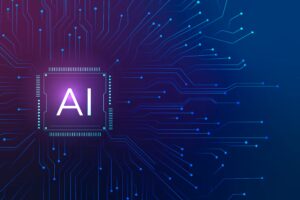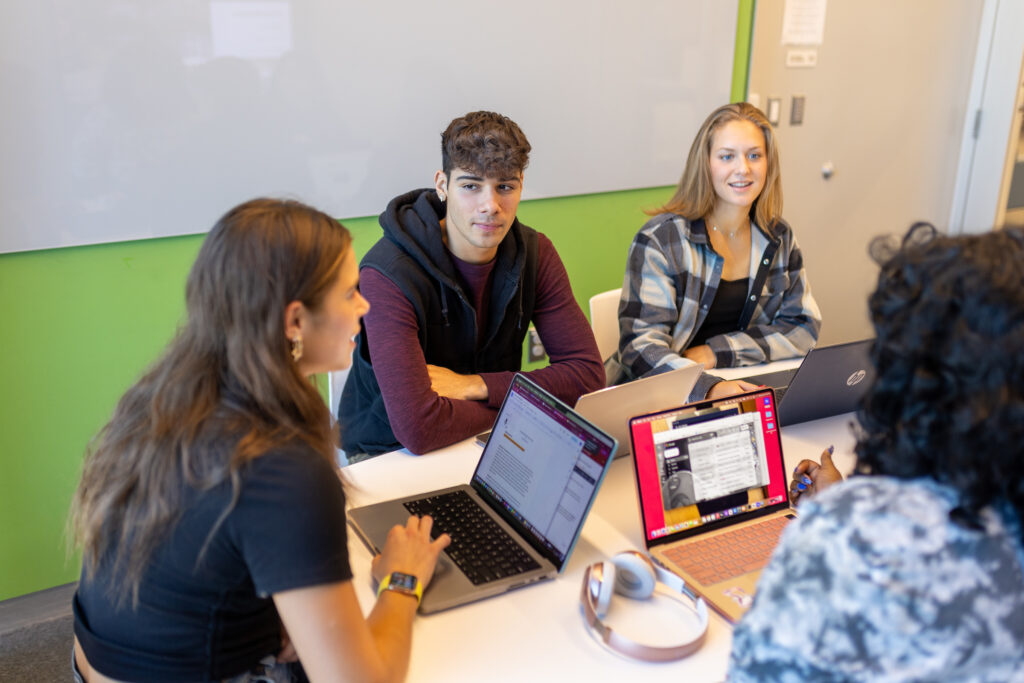- About Ramapo
- Academics
- Admissions & Aid
- Student Life
- Athletics
- Alumni
- Arts & Community
- Quick Links
- Apply
- Visit
- Give
Chat RCNJ: Campus-Generated Conversations about AI

by Victoria Vuz ‘24
On April 3, in a bid to foster dialogue and understanding between faculty members and students, Ramapo College hosted a dynamic panel discussion where students shared firsthand experiences of how Artificial Intelligence (AI) is shaping their coursework, studies, and career trajectories. The event provided a platform for an open exchange of ideas, highlighting both the positive contributions and potential challenges AI poses in higher education. The student panel, composed of a diverse group of undergraduates and students from various disciplines, offered nuanced perspectives on the role of AI in their academic journeys.
While students at Ramapo College increasingly embrace Artificial Intelligence as a valuable tool in their academic pursuits, a discernible undercurrent of cautious optimism permeates their attitudes. As AI becomes more integrated into education, students navigate a delicate balance between harnessing its potential and safeguarding against its risks.
“I’m grateful for the convenience AI brings to my studies,” says Music major Christian Laurente ‘25. “But at the same time, I’m mindful of its implications. I try to use AI ethically and responsibly to avoid unintended consequences.”

Students work collaboratively in a study room in the Learning Commons.
The sentiment among students is one of appreciation for the myriad ways AI enhances their learning experience. From personalized study guides to generating ideas, AI has revolutionized the educational landscape, offering tailored support and unlocking new avenues for exploration.
“Using AI helps me by constantly sparking new ideas and inspirations for my writing,” remarked History major, Bella Apgar ‘25. “With its ability to generate thought-provoking prompts, AI has become an indispensable tool in my creative process, helping me explore new perspectives and dive deeper into my storytelling.”
Across campus, students are leveraging AI to streamline their study process and maximize their learning outcomes. Adaptive learning platforms analyze individual learning styles and preferences, delivering customized content and practice exercises tailored to each student’s needs. This personalized approach helps students grasp challenging concepts more effectively and fosters a deeper understanding of course material.

Dr. Michael Bitz, director of the Instructional Design Center
“Like any technology, generative AI has incredible potential for positive impacts on teaching and learning, and it also has the potential to be negative and destructive,” noted Dr. Michael Bitz, Director of the Instructional Design Center. “It all depends on how we put it into context and talk with students and each other about the ethical and inspirational ways that we can use this technology.”
While AI undoubtedly offers valuable support in various educational tasks, there is a concern among some educators that its pervasive use could potentially lead to students relying too heavily on automated solutions, thus reducing their critical thinking and problem-solving skills. With AI algorithms providing instant answers and solutions to academic queries, students may become accustomed to a passive learning approach, where they rely on technology to think for them.
“AI can make students lazy. If you rely on this tool to do the work for you, there’s no need to think critically since AI will give you the answers,” noted Elementary Education major, Mercedes Blackwell ‘26. “It depends if students are using AI to help with one question they are confused about or if they are using it for everything.”
Furthermore, as AI technologies continue to advance, students are increasingly grappling with uncertainties about the future of work and the evolving demands of the job market. The panelists highlighted the need for greater awareness and proactive measures to address these challenges effectively.
“As future professionals, we must confront the reality that AI is reshaping industries and redefining job roles,” stated Merit Kayastha ‘24, a Bioinformatics major. “But we also need support and guidance to navigate this rapidly changing environment and ensure our skills remain relevant.”
Despite these apprehensions, students remain optimistic about the transformative potential of AI in education and beyond. They emphasize the importance of education and dialogue in navigating AI’s ethical and societal implications, calling for interdisciplinary collaboration and critical thinking to harness its benefits responsibly.
“It’s our responsibility to shape the trajectory of AI in a way that serves the greater good,” concludes music major Christian Laurente ‘25. “By approaching AI with optimism and caution, we can leverage its power to drive positive change in our use of this technology.”
Faculty members in attendance expressed appreciation for the students’ candid insights, noting the importance of incorporating student perspectives into ongoing discussions about the integration of AI in higher education. The dialogue sparked valuable reflections among faculty members, prompting a deeper examination of how students use AI while addressing emerging challenges.
“I’m incredibly impressed by the depth of insight shared by our students,” remarked Priscilla Tovey, Coordinator of Faculty Outreach for the Center for Reading and Writing. “Their perspectives underscore the need for ongoing dialogue and collaboration as we navigate the evolving landscape of AI in education.”
As Ramapo College continues to embrace AI as a catalyst for innovation and learning, students remain at the forefront of this transformative journey, advocating for a balanced approach that maximizes the benefits of AI while safeguarding against its potential risks. With a blend of enthusiasm and vigilance, they navigate the complex terrain of AI, poised to shape its future trajectory in education and beyond.
Copyright ©2025 Ramapo College Of New Jersey. Statements And Policies. Contact Webmaster.

Follow Ramapo